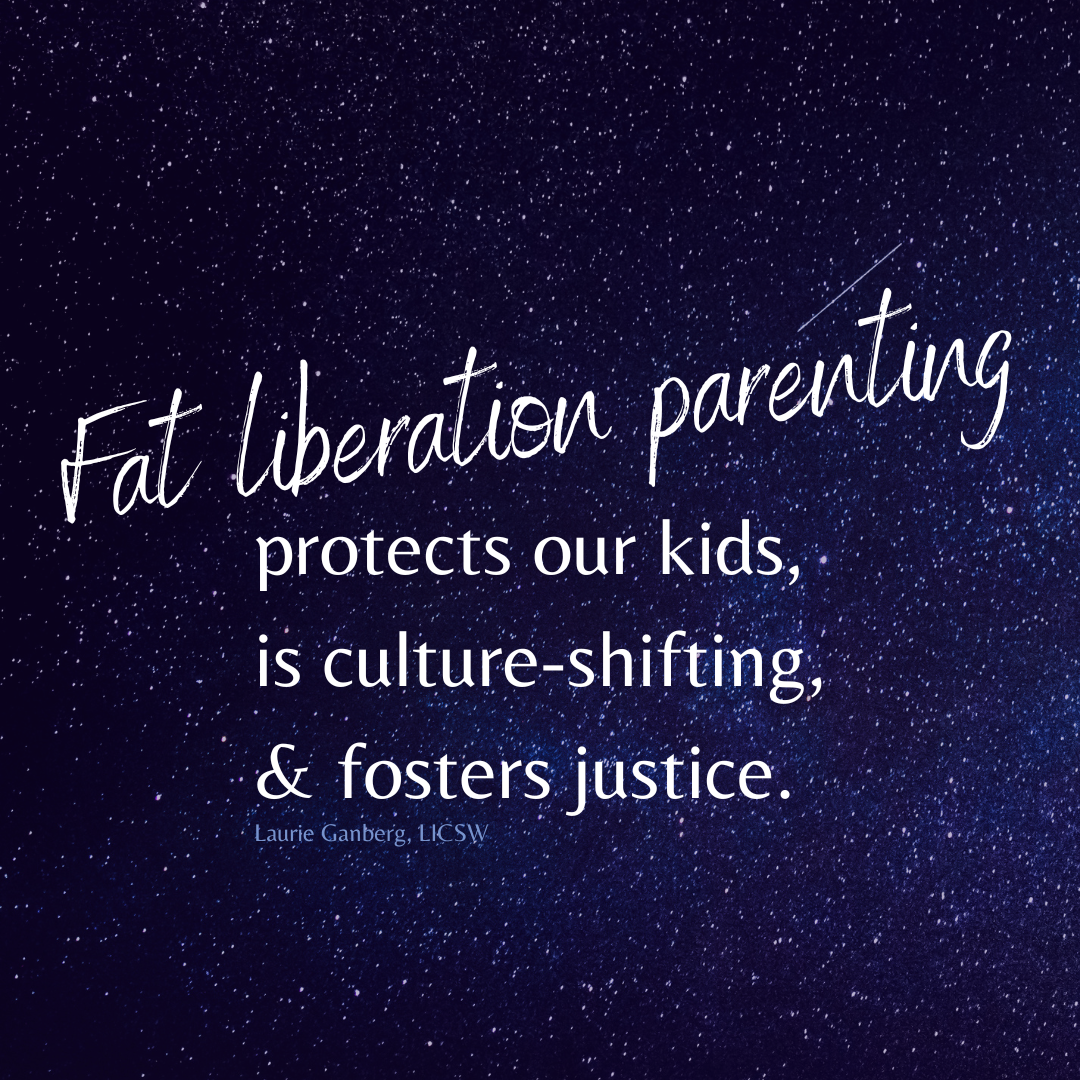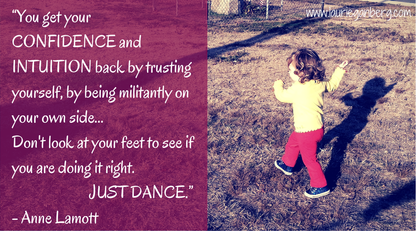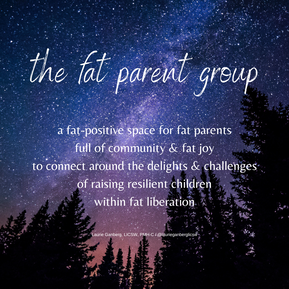
While the intersection of fat liberation and parenting can be an amazing counter-cultural, anti-oppression practice, it can also feel like a lonely place.
But you're not alone and you deserve community. That's why I'm creating a Fat Parent Group. The Group will be an opportunity to gather with other fat parents who *get* it; receive and lend support; and process the joys & challenges of raising resilient children. The group will be facilitated by me, Laurie Ganberg, LICSW (fat therapist and parent), but it's not therapy. It's a chance to gather with other fat parents who value raising kids to trust their bodies, free from diet-culture and anti-fat bias. And you can join from anywhere! Meeting on the second Wednesday of the month in 2023: August 9, September 13, October 11, November 8, December 13 @ 4:00-5:15pm (PST) Logistics

"Being with" is a concept that shows up a lot when you're a therapist, supervisor, and parent; and it's illustrated beautifully in the children's book The Rabbit Listened by Cori Doerrfeld.
The urge to fix — to provide a solution, to solve a problem, to make your kiddo happy again — is powerful and comes from a place of wanting to help. Yet, this instinct can be the opposite of helpful. You've heard the folks who say, "hey, just relax!" in response to someone's worries, right? It comes across as invalidating, condescending, and definitely unhelpful. When we're able to be with someone in their experience, we can be curious, we can better understand, and ultimately, we can probably be more helpful. In Doerrfeld's book, the rabbit comes along to provide a compassionate presence and and a listening ear; eventually, the child is able to share their story, their emotions, and figure out what to do next. In therapy and supervision, I aim to be a compassionate, nonjudgmental presence and I try to notice those urges to fix when they come up. In doing so, I hope I'm also modeling and supporting my clients in learning how to be with their own experiences and emotions. (The opposite of this is mindless social media scrolling, Netflix binges, etc — a fine distraction some of the time, but not very useful as a long-term strategy.) In the realm of parenting, it can feel even harder. Being with your child in their hurt, sadness, anger, shame, or fear can feel excruciating. When we can do that, we demonstrate that these emotions are tolerable and not something to be feared, avoided, or pushed away. And, when we let go of the responsibility of making our children happy (something we can't really do anyway) there's a sense of relief. All we have to do is be there and listen.
I participate in Bookshop.org's affiliate program. You can see more recommendations at https://bookshop.org/shop/laurieganberglicsw. If you end up buying a book through one of my links, I earn a small commission and they donate the same amount to independent bookstores. Many, if not all, of these books can also be accessed through our amazing public library system, often as physical books, ebooks, or audiobooks!
I've been getting lots of great responses in my survey of groups and classes for pregnant women, parents-to-be, and new parents. Please, keep them coming! If you're expecting a child, have a young child, or work with expectant and new families, please share your thoughts in the survey below. Responses are anonymous, but if you have any feedback or groups you want to share with me directly, please feel free to contact me! And if you want to be sure to get the compiled results and hear about next steps to meet the needs in the community, sign up for my newsletter.
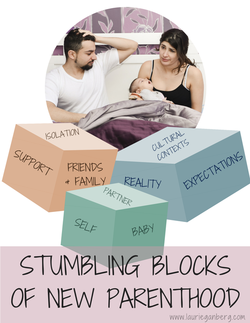 Recently, there was a blog post by a new mother about how amazing her experience of motherhood was: "They should’ve warned me that my life was about to become so rich and beautiful and fulfilling, that I’d look back on what it was before and think, “Poor me. I didn’t know her yet.”". Predictably, there were responses decrying the one dimensionality of her piece: "I'm biased, having found the experience of parenting wonderful AND hard." This media hubbub about what we should be telling pregnant women and expectant couples about the realities of parenthood illustrates the conundrum of educating parents. Everyone's experience of the early postpartum period is different, influenced by their own health; their support system; their baby's temperament; their family of origin and history; their socioeconomic and work situation; their cultural, racial, and ethnic background; and countless other factors. I've been mulling all this over with my Becoming Parents Workshops. How do I offer a workshop to prepare parents-to-be to face common challenges inherent in life with a new baby, without resorting to scare tactics, all while acknowledging that neither I - nor they - can know what their reality will be until they're actually living it? Stumbling blocks are common issues that can arise for new parents. Some new mothers will be able to gracefully step over one or all of them. Others will be tripped up momentarily. And a few will be brought to their knees. But, recognizing these stumbling blocks makes it easier to avoid falling over them & to stitch together a safety net for the family. Balancing Needs 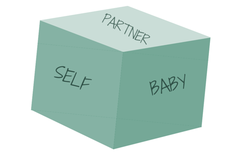 A newborn is completely dependent on her parents for nourishment, comfort, care, even for help burping. Of course meeting her needs is the priority; yet, I'm going to employ the tired airplane oxygen mask metaphor and say that mothers need to take care of their own needs in order to be able to take the best care of their babies. And where does the partner figure into this scenario? He or she also needs to figure out how to take care of their own needs. Then, both partners can be mindful of taking care of each other and their relationship. When parents feel like they're functioning well as a team, they're better able to handle the challenges of meeting baby's needs. The challenge is finding time and energy, and understanding the other's experience. It's a process to learn how to do this - I can't give anyone a magic formula (though I would if I could!) - but when a family goes through this learning curve to balance everyone's needs, they'll also be better able to shift how needs are met over time as the baby grows and the challenges change. Practical suggestions: Hire a postpartum doula for extra help in the early months, make sure each partner has opportunities to take care of the baby solo to gain confidence and competence and let the other partner get out of the house, put the baby down in a safe place when he won't stop crying and take 5 minutes with headphones on, or in the shower, or out on the porch to breathe and regroup. Reconciling Reality and Expectations 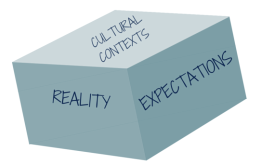 Imagining life with the baby is one of the joys of pregnancy. But it's inevitable that there will be discrepancies between those dreams and reality. Understanding how often a newborn baby needs to eat (8 to 12 times in a 24 period) and why (because their stomachs are tiny - only the size of an egg by weeks 2-3!) can help parents-to-be realistically anticipate life with baby. I spend time in my workshops talking about breastfeeding basics so that both parents can be on the same page and I make sure parents know where to turn for help if they run into challenges feeding the baby. Plans about, wishes for, and the reality of maternity/paternity leave also often clash. In the US, there's a propensity to think about maternity leave as "vacation" and I often see new mothers trying to do too much while they should be healing, learning and bonding with their baby, and taking care of themselves. And thanks to our lack of paid family leave, partners are often lucky if they can take 1 week off, while most mothers that I work with cobble together 6-12 weeks using sick time, vacation, short-term disability, and unpaid time off. There are other families that realize after the baby is born that the cost/benefit analysis of daycare and work shakes out differently and plans they made during the pregnancy change. Practical suggestions: Pregnant women can usually attend breastfeeding groups; if you're planning on breastfeeding I recommend going once before you have the baby. You'll likely see women nursing their babies; hear about breastfeeding realities, pumping, and a few tips/tricks; and meet the leaders or facilitators of the group. A friend pointed out that she was much more likely to contact one of the counselors at a local breastfeeding group once she'd met them, rather than cold-calling with a problem in the early days of her baby's life. Again, a postpartum doula can help new parents understand typical newborn behavior, develop and bolster trust in those parental instincts, and be a resource for questions about your baby. Babies are constantly developing and changing. When you think you have it figured out, your baby's going to switch it up; and when you think you won't be able to handle your baby's challenging behavior anymore, your baby's going to switch it up. Remind yourself "this will change" (without any pressure to enjoy it!). The same applies to new parents: make plans as best you can, but anticipate that you and those plans might change. Hint: there's usually not just one "right" decision. The who/what/why/how of asking for help 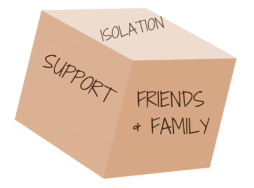 The last stumbling block I want to talk about is the tension between wanting time to adjust to being a new family of ___, understanding extended family's desires to meet the baby, making sure no one becomes isolated, and asking for help. Of course these building blocks are all connected and, often, expectations and reality need to be reconciled about how family or friends will help once the new baby arrives. Challenges frequently arise in relationships with parents and in-laws - now "the grandparents." Becoming a parent can be a time to reflect about your own childhood and identify ways you want to emulate your parents or do things differently. You may be surprised by your own strong opinions about how family members act with the baby and may be uncomfortable expressing your wishes. Or you may find that others can't follow through with what you ask of them and disappointment or anger rises. When family relationships are complicated, they often become more complex with the changes in family roles. For expectant couples who have lost parents, grief can resurface during pregnancy, birth, and the postpartum. A note about isolation: It is very easy to become isolated in the postpartum period. There are many cultures that prescribe a period of time (often 30-40 days) that a new mom stays at home with the baby, but often in these cultures, they are being visited by extended family and community members who are helping, talking with them, and taking care of them and the home. In the US, we have neither the cultural expectation that a new mother stay at home for a period of time, nor do we have the systems of support (visiting nurses, close family, family leave) that other countries and cultures create for new families. So parents-to-be are often left to build community around their new family, utilizing paid help when possible, friends/family/neighbors when available, and local formal and informal groups of other new parents. Practical suggestions: Spend some time during the pregnancy preparing a postpartum plan. We do this in my Becoming Parents Workshop. At a minimum, include specific information about local breastfeeding and new parent groups along with a plan for help with meals. Ask a friend or family member to set up a meal train (there are many, free options). On the baby registry, ask for an Instacart membership or other grocery delivery service. Once again, a postpartum doula can be a valuable additional support for those families that can afford to hire one - another thing to think about including on a registry if it's outside your means. Lastly, be aware of the signs of postpartum emotional distress and how the baby blues differ. If you find yourself or your partner struggling, please reach out for help. Postpartum Support International has an English and Spanish warmline available, or contact me. 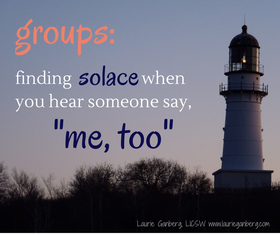 For the first time mother, a new moms group can be an anchor during long days of on-demand feedings and unpredictable naps. It's a commitment outside the house. No one cares if there's spit up on the baby's (or your) outfit. And you can find reassurance that others are going through the same challenges, while hearing from the experienced moms of babies a few months older that it does in fact get better - or at least change. Groups combat the stir-crazy. When your mind immediately imagines getting into an accident every time you put your baby in his car seat; when the pure physical ache of grief floods you each time you try to stand up; when you are facing yet another roller coaster month of hope and despair and anger; when you can't stop yourself from yelling at your child you can feel enveloped in a fog of isolation.
For these individuals dealing with postpartum emotional complications, loss, infertility, parenting challenges—and so many more issues—a support group can be a lifeline. The mere act of being in a room with others fights that isolation. In a group, you hear that others have said/thought/felt/done similar things. They nod, they pass the tissues, they laugh with you, and their eyes tear up because they recognize your story. Sometimes you have the perfect resource or a "been there done that" to share that helps someone else. Sometimes you just want to go to report a great success. You can leave a support group more confident, less alone, with a tiny bit less stress, with an idea to implement, simply lighter after a good cry or a vent or a laugh. You can find solace in a group. Resources:
So, I promised to come back to the idea of intuition, how to find it and stick with it. Because, while it may feel easier to "stop the chattering mind" in order to make space for intuition in solitude, most of us aren't parenting in a peaceful, zen place away from all meddling, well-meaning voices that feed the rational mind's desire for a plan: a promise of steps to follow to succeed in raising this baby/toddler/teenager seeking - messily, noisily, and sometimes inconveniently! - to get their needs met. So, what then? Here are three things to help tap into your own intuition:
And lastly, just a word about posts on the internet - including this one! If something I've written here resonates, fantastic. If it doesn't land well, that's ok. I strive to write the way I approach my private practice: from a supportive, nonjudgmental place. I hope you "take what works and leave the rest" from my writing and from all the rest of the internet, too! |
Therapy, Groups, Supervision, Consultation, Training in Seattle, WA and online in Washington state
Laurie Ganberg, LICSW, PMH-C (#LW60673320) ~ Specializing in Perinatal Mental Health, Trauma, & Fat Liberation
Now practicing through Fiddlehead Therapy, PLLC with online services and in person in Mountlake Terrace, WA
Home | Privacy | Contact | Zoom Link
© 2019-2024 All rights reserved
Laurie Ganberg, LICSW, PMH-C (#LW60673320) ~ Specializing in Perinatal Mental Health, Trauma, & Fat Liberation
Now practicing through Fiddlehead Therapy, PLLC with online services and in person in Mountlake Terrace, WA
Home | Privacy | Contact | Zoom Link
© 2019-2024 All rights reserved

